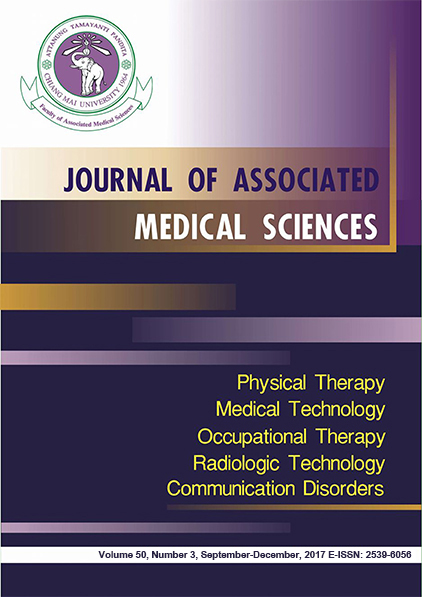Factors related to quality of life among stroke survivors
Main Article Content
Abstract
Background: Stroke is a major health problem effected to stroke patients, especially to quality of life among stoke survivors.
Objectives: To explore quality of life (QOL) and factors related to quality of life in 140 stroke survivors at Chiang Dao city of Chiang Mai Province.
Materials and methods: This study is a descriptive correlational research of stroke survivors to Amphur Chiang Dao, Chiang Mai Province. Subjects were questioned about demographics data, severity of disease, level of activity daily living and quality of life. The instruments used for data collection was questionnaire for demographic data, Modified Rankin Scale, Barthel ADL Index and Quality of Life Questionnaire developed by Ferrans and Powers. Data analysis was performed using descriptive statistics, point biserial correlation, Spearman rank correlation coefficient and multiple regression analysis.
Results: The results revealed that mean scores of overall QOL of life, health and functional ability, psychological/ spiritual, social and economic and family dimensions of participants were at a moderate level. Factors including personel relationship with people in community, care giver environments and muscle power of upper extremity were shown significantly correlated with the quality of life in stroke survivors as same as the level of severity and level of activity daily living (p<0.05). In addition, independent factors include co-morbidity, drinking alcohol, care giver, duration of caring, duration of stroke and level of severity were significantly influencing the predictors of quality of life of stroke survivors (p<0.05).
Conclusion: The findings can be used as a guide to develop rehabilitation programs to improve overall quality of life.
Article Details
Personal views expressed by the contributors in their articles are not necessarily those of the Journal of Associated Medical Sciences, Faculty of Associated Medical Sciences, Chiang Mai University.
References
2. Report on stroke prognosis [Internet]. 2014: Bureau of Disease Not Communicable Department of Disease Control. [cited 2015 Jul 23]. Available from: http://www.interfetpthailand.net/forecast/files/report.../report_2014_no20.pdf (in Thai).
3. Stroke situation [Internet]. 2015: Bureau of Policy and Strategy Ministry of Public Health [cited 2015 Jul 30]. Available from: http://bps.moph.go.th. (in Thai).
4. Raksaken K, Sittipakorn S, Wongpiriyayothar A. Quality of life of stroke survivor after the first six month, Mahasarakham Hospital. J Sci Tech MSU 2013; Special edition of the 9th Mahasarakham University Conference: 164-71.
5. Oupra R, Ruengkhome C, Wongpalee J, Kantawong E. Stroke caregivers’ care giving experiences. Rajabhat J Sci Hum Soc Sci 2011; 12(2): 50-59 (in Thai).
6. Piyabunditkul L. Exploring patient’s problems to improve quality of life after stroke in community. J Nur Assoc Thai, North-Eastern Division 2012; 30(4): 6-13 (in Thai).
7. Prombut P, Piaseu N, Sakulhongsopon S. Factors related to stress of family caregiver of patients with stroke at home. Rama Nurs J 2014; 20(1): 82-96 (in Thai).
8. Pongcharoen C, Maneewong J. The effect of preparing program on readiness among hemorrhage stroke pateint caregivers before dischage at Chaophraya Yommajaj Hospital, Suphanburi. Nur J Minis Pub Hea 2011; 21(1): 58-70 (in Thai).
9. Raksaken K, Sittipakorn S, Wongpiriyayothar A. The relationship between functional ability, depression and quality of life of stroke survivors after the first six months. J Sci Technol MSU 2014; 33: 686-94.
10. Sathirapanya C, Sathirapanya P. Factors influencing depression among patients with stroke. Songkla Med J 2005; 23: 229-237 (in Thai).
11. Sirisom S, SangSuwan J, Sittichakrot J. Factors related to coping. In elderly stroke patients. North-Eastern Thai J Neu 2013; 8(2): 70-81 (in Thai).
12. Singhpoo K, Charerntanyarak L, Ngamroop R, Hadee N, Chantachume W, Lekbunyasin O, et al. Factors related to quality of life of stroke survivors. J Stroke Cerebrovasc Dis 2012; 21(8): 776-81.
13. Chanchai A, Chuyingsakultip N, Gadudom P, Kaewdang K. Effects of stroke caring program on knowledge, skills, activities of daily living, complications, and program satisfaction among acute ischemic stroke patients/caregivers at Rayong Hospital. J Phrapokklao Nur College 2013; 25(1): 78-89 (in Thai).
14. Gbiri CA, Olawale OA, Isaac SO. Stroke management: Informal caregiver’s burden and strains of caring for stroke survivors. Ann Phys Rehabil Med 2015; 58: 98-103.


